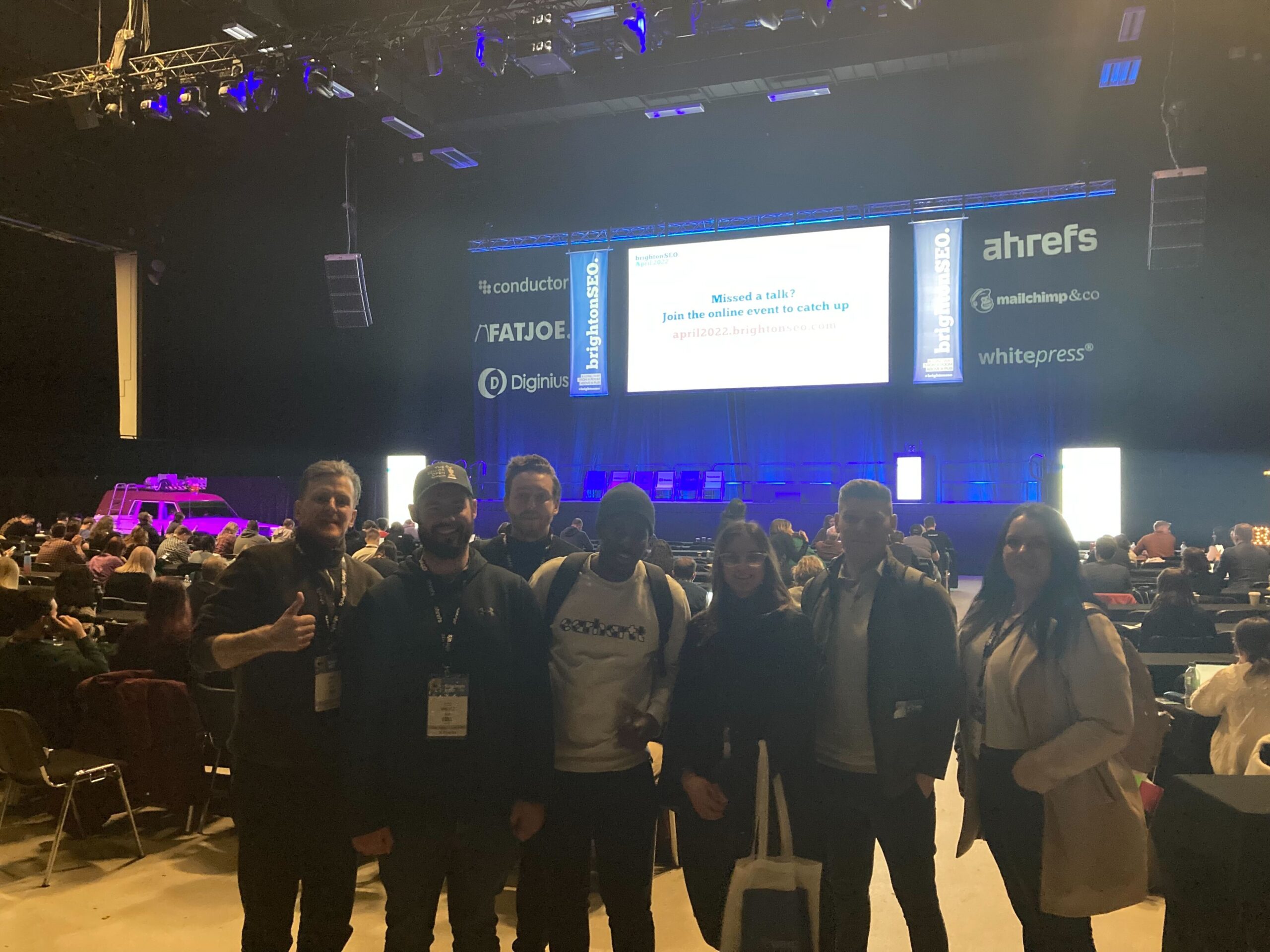What the 93x SEO team learned at BrightonSEO
Last week, thousands of marketers flocked to the British seaside city of Brighton to enhance their skill sets and expand their outlooks on search engine optimisation.
BrightonSEO, known as the place ‘where search marketers go to learn to do their jobs better’, is arguably one of the biggest SEO conferences in the world. If you thought our 93x SEO team would miss the opportunity to attend, you’re sorely mistaken! They hopped on the train last Thursday for 2 days worth of learning, and arrived at work on Monday with bucket-fulls of new SEO ideas, inspiration and motivation.
We don’t keep our SEO insights to ourselves though, no way! Here’s what the team learned at BrightonSEO last week.

Michael, SEO Account Director learned:
1. How much there is to know in SEO and how much it overlaps with other marketing channels
Just seeing so many speakers talking about the same topics but with completely different facets and outlooks shows the true scale of the SEO world, and the different approaches you can take to almost any part of it.
It’s really important to remember that for every business, SEO is only part of the marketing strategy, so trying to push SEO priorities above everything else is never going to resonate with a marketing-savvy business. It’s all about finding the balance between Search and other channels to develop a tailored, best-fit digital strategy.
2. The true power of the SERP and using SERP data for analysis
Just hearing how passionate speakers are about the power of the SERP really shows you how much insight there is to find from it. From using ‘People Also Ask’ panels, to understanding the questions your customers ask through to the related searches, to understanding the full ecosystem of your audience, there is so much gold in the SERP!
3. Why reporting automation is crucial
So many of the talks at BrightonSEO were about SEO reporting, which can be a time-consuming nightmare with no real answer as to why performance has changed! So, automation of reports is super important to allow for the data to be ready in real-time, and easily digestible, and then to be able to build out the context of why performance has changed. Using modern dashboards, BIs or advanced reporting tools is important to make sure SEO reporting isn’t overly time consuming, and is super valuable.
Jasmine, SEO Strategist, learned:
1. Zero search volume keywords are not what they seem
It’s easy to overlook keywords that appear with 0 search volume in our keyword tools – why would we try and target something no one is searching for? I have wondered how those keywords make it into the tool in the first place… Mark Williams-Cook helped shine a new light on this in his talk around why it’s important to consider zero volume keywords in our research.
Mark really highlighted the need to consider intent volume, rather than search volume, as it turns out that search volume in tools isn’t 100% accurate! With around 15% of searches every day being totally brand new, it’s really not impossible to think that someone with a specific need will turn to search engines with a specific query that we just might have been able to answer had we considered them in our research.
I very quickly learned when joining the team that many of our clients operate in niche markets, with a specific set of services and a specific type of customer. So, it’s totally normal to target low search volume keywords, but this session really helped me reconsider whether a zero volume keyword is garbage, or if it’s value that’s been disguised in our keyword tools. Therefore, it’s up to us as SEOs to interrogate potential opportunities further and appeal to every tiny corner of our audience. We can also educate and help our clients understand the hidden opportunity behind keywords which may appear to have no value on the surface, but can hold the key to higher conversions.
2. Keep users in focus with content maps
Rejoice Ojiaku delivered a fantastic session on content mapping, and how it helps to ensure your customer is at the forefront of your work. Rejoice used characters to illustrate the content map story, and it really has helped me visualise doing something similar.
Not only can building out content maps help you understand your customers and how they navigate their journey to you, but it can help you identify any holes in your content strategy. A map can double as a keyword map to help build out your content library and keep track of what you have already.
Content duplication is easy to do and time-consuming to correct, so having a clearer view will help reduce this. Better consideration of customers will force you to really think about your goals, such as, ‘what will targeting this keyword bring to this type of customer?’, ‘will this piece of content provide any more value than this similar piece from a year ago?’, and ensure that the answer involves the customer.
3. Stay competitive with gap analysis
SEO is easily misunderstood if it’s not your day job, and getting stakeholder buy-in can be a struggle. Lidia Infante provided some brilliant gap analysis tips to use in SEO strategies, and in a way that senior business professionals will be more likely to sign off – being competitive! Everybody wants to be the best, and SEOs can provide powerful insights into how we can utilise readily available information about our search competitors to establish a growth plan.
We can help them understand why we’re not performing, and present improvements with timelines, estimates and specific actions in a neat, valuable package that would be hard to say no to. I believe we shouldn’t just do what our competitors do, but do something bigger and better. Thanks to Lidia sharing her experiences, I’ve got some really great tactics to help c
lients who want to be more competitive.
5. Tie dye is my new favourite thing
BrightonSEO always has lots of fun stuff, and this year they had a make your own tie dye design.
I think this is what SEOs would have worn if it existed in the 60s.
Herve, SEO Executive, learned:
1. Set a quality assurance framework
Our SEO team has done a really good job in setting up a well structured, well-resourced foundation, however, there’s always room for improvement. The quality assurance talk was perfect for learning about structuring frameworks in your organisation to limit future errors from occurring.
2. Beyond the Basics with Google Business Profile Optimisation
There have been some major recent changes to Google My Business, or should I say Google Business Profile with Google renaming the API and removing the app from all app marketplaces. I was really interested to see what all the buzz was about, and if there are any new ways we could optimise our client’s Google Business Profile to truly make the most out of this brilliant SEO tool.
Claire Carlile went above and beyond the basics of GMB Optimisations. Covering very clever methods of monitoring your Google Business Profiles through UTM tracking – allowing you to view how much traffic the Google Business Profile is driving, and the types of queries people are searching to find your Google Business Profiles. Claire also shared two great resources: local SEO 4 local people & GBP monitoring tool which I really look forward to using. Additionally, Claire mentioned the importance of optimising the images that are uploaded to Google Business profiles by ensuring the images include keyword related file names, to help search better understand the context of those images and how they relate to the business.
3. Using Search intent with your link building efforts
One of our top priorities this year in the SEO team is to improve our link building resources and how we work on acquiring links for clients.
Chris Czermak from MacNaught Digital provided a really insightful talk covering the ways to create content that generates natural links. These types of content include:
- Statistics & trends
- How-to guides
- Tools & templates
These are all great forms of content that I will be sure to propose to our clients. Chris also touched on the value of analysing competitors or similar web pages within the SERPs, and using a tool such as Majestic to view their backlink profile to find new opportunities for potential links to target.
Dan, Senior SEO Strategist, learned:
1. The importance of quality assurance to SEO
Following on from Hervé’s point on quality assurance, Aleyda Solis, Myriam Jessier, Gianna Brachetti-Truskawa and Becky Simms all provided some interesting insights into improving quality assurance when working on SEO campaigns. The main takeaways for me were:
- Set up relevant alerts for keyword rankings, site performance, GSC and Google Trends – with an emphasis on relevant, as too many alerts defeat the object and just fill up your inbox and annoy you.
- Integrate these alerts with your communication platforms (such as Slack) as well as your work email to ensure you or your team don’t miss anything important. Zapier is a good integration tool for this.
- Set up weekly crawls of clients sites to ensure any problems are picked up quickly. Little Warden, Content King and Pingdom are all useful tools in this regard.
2. Thoroughly optimised Google My Business Google Business Profiles, even for B2Bs
Again, following on from Hervé’s point, Claire Carlile provided some useful tricks for better optimising client’s Google Business Profiles, such as:
- UTM tags can be used to separate Google Business Profile traffic from generic organic search traffic. This allows you to monitor the performance of your profiles as you introduce new optimisations as well as show the importance of GMP traffic to internal stakeholders.
- Images are massively important to search users, even in B2B. They are a significant factor in building user trust in your business, so they need to look professional and help search users better understand your brand. As images can be uploaded by search users as well as the profile owners, it’s important to regularly review user uploaded photos and report any that are irrelevant.
- As well as monitoring images, reviews should also be regularly reviewed. Responding to reviews (good but especially bad) helps build trust in your brand and shows you are active and engaged with your customer base.
3. Engaging with the wider SEO community
Attending BrightonSEO proves the importance of engaging more with the wider SEO community. It’s a very welcoming and collaborative space where people are very eager to share their insight with no worries about losing their competitive edge, which is very generous and not very common in the business world.
As well as providing the opportunity to talk to the people behind some of the most cutting edge SEO tools on the market, BrightonSEO also provides a great opportunity to talk to some of the leading figures in the world of SEO and digital marketing. Not to mention the retro video games, free snacks and booze, and, of course, the chance to get to know the 93x team better after two years of remote working.
